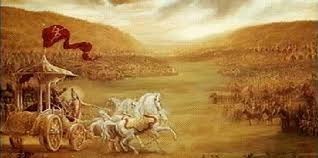What is Dharma?In Sons of Gods I've generally avoided San...

What is Dharma?
In Sons of Gods I've generally avoided Sanskrit terms. One of the exceptions, however, is the untranslatable word Dharma; a concept that simply does not exist in the West.
Put simply, Dharma is a composite of many concepts. It includes the idea of duty, righteousness, right action and inner attitude; and yet it is more than the sum of these parts. To act within Dharma is to do the right thing, right now, taking into consideration all aspects of that action, past, present and future, as well as individual temperament and needs, and the needs of others affected by that action; and to do it free of anger, resentment or greed.
The Indian mind, for a Westerner, is complicated. There is no "right" and "wrong"; everything is subjective, yet not in the modern, Western sense, which gives licence to the fulfilment one's own needs and desires as long as they don't infringe on the well-being of others. Dharma is not about doing whatever you want, or fulfilling your own desires. In fact, acting within Dharma quite often means the denial of one's own desires, and sometimes, even, the acceptance of unfavourable circumstances. It might be best understood under Reinhold Niebuhr's"Serenity Prayer":
God, grant me the serenity to accept the things I cannot change, the courage to change the things I can, and the wisdom to know the difference.
But Dharma goes beyond the Serenity Prayer, for it includes the concept of knowing and doing one's duty, as well as one's attitude towards that duty; the idea that selflessness, in the end, has a higher value than selfishness, and brings with it a higher final reward. Duty must be fulfilled without complaint and without whining: Just Do It, whether or not it results in the things you want. This, for the Hindu, is true strength. It is taught in the Bhagavad Gita, the core of the Mahabharata, by Krishna as acting without attachment to the fruits of action.
In the Mahabharata, Yudhisthira is the one character who embodies the concept of Dharma; in fact, he is sired by the god of Dharma, and because Dharma is the code by which he lives he becomes known as King Dharma. To the Western reader, Yudhisthira may appear too good to be true. He might seem goody-goody, regarded as too meek and mild. Why does he not resist Duryodhana more? Why does he not take the advice of his brothers and destroy his enemy before the situation grows to a head? Why is he so calm and at peace when they are exiled for twelve years? What is wrong with him?
But Yudhisthira is by no means perfect; he falls victim to his own vice, and even then his behaviour is too good to be true, resulting in the violation of Draupadi, and, finally to war. This is one of the lessons of the Mahabharata: there is no guarantee. You are responsible for your own actions, but you cannot control the actions of others. The only real choice you have, at any moment in time, is to be true to your own being.



